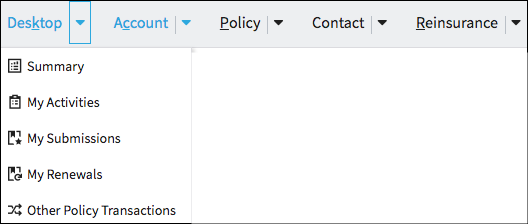Tab bar
Usage
InsuranceSuite has a tab bar with drop-down menus.
Include a persistent tab bar to guide users through InsuranceSuite applications.

Note: The tab bar can be expanded. Follow best practices for expanding the tab bar.
The tab bar also includes visual cues indicating saved or unsaved work:
- When no changes have been made or all changes have been saved, the icon is gray
 .
. - When users have modified data but not yet saved their changes, the icon is
green.
 .
.
PCF elements
Primary function
- Tab Bar
-
- Hidden Link
- Tab
- Tab Bar Link
- Tab Bar Logout Link
- Tab Bar Unsaved Work Link
- Menus
-
- Menu Divider
- Menu Item Set
- Menu Item Set Ref
- Basic Menu Items
-
- Checked Values Menu Item
- Menu Item
- Menu Item Iterator
- Menu Item Tree
- Picker Menu Item
- Search menu Item
- Special Menu Items
-
- Add Entry Menu Item
- Add Entry Menu Item Iterator
- Checked Values Menu Item Iterator
Secondary function
No elements use this widget as a secondary function.
Best Practices
Main Navigation Bar
- Make the tab bar persistent.
- Keep menu labels short (avoid complete sentences) and leave sufficient space for localization.
- Use title case for all menu labels.
- Make sure that each link represents a clear, distinct category based on a well-planned site architecture.
- Highlight the selected link to indicate the current location. Highlighting
helps orients users.

- Limit the depth to a single level. If a submenu contains more than five items, consider giving it its own menu.
Expanding the Tab Bar
Do not simply tack on additional menu items. Drawing on analytics and current user research:
- Use precise labels that:
- Clearly distinguish each menu in the TabBar. Menus must make sense alone but also in conjunction with the other menus in BillingCenter, ClaimCenter, or PolicyCenter.
- Accurately reflect the information in each menu.
- Consider localization. Languages, such as French, Spanish, and German require 30% to 50% more space than English.
- Test additions and modifications with users in order to assess nomenclature and ease of use.
